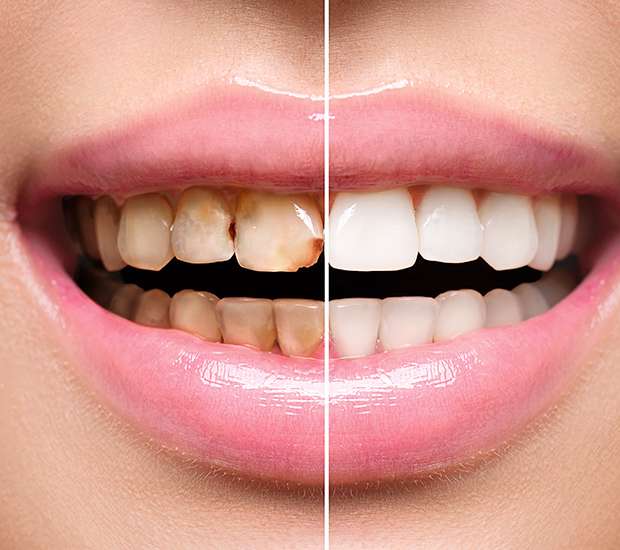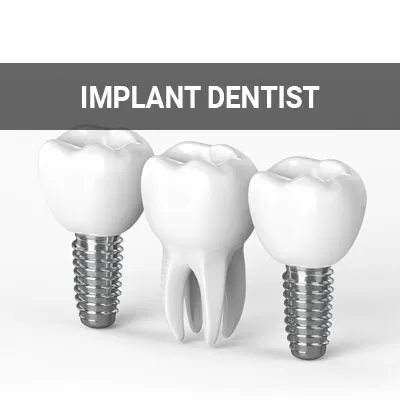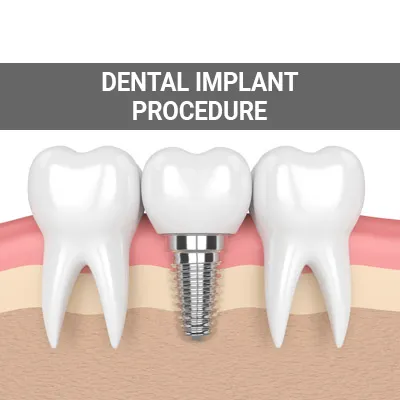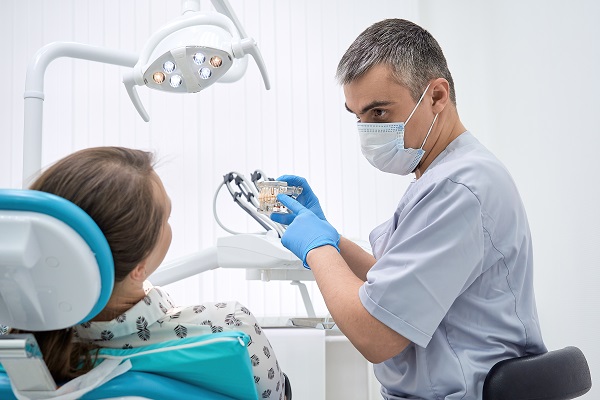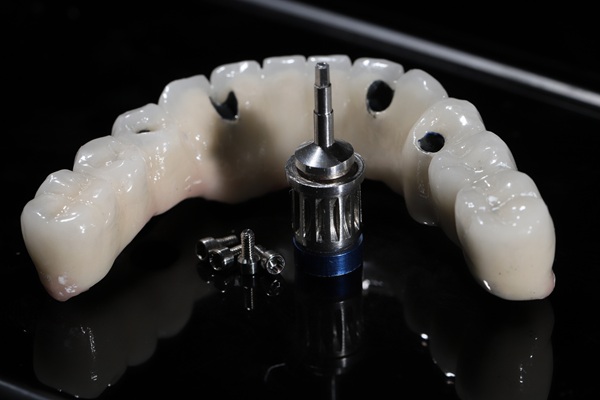Dental Implant Restoration Mechanicsburg, PA
Dental implant restorations are one of the most popular tooth replacement options available for people who have lost one or more teeth. Dentists insert these implant posts surgically into the jawbone, so they replace the root of the lost tooth or teeth. Dental implant restoration is a process of restoring the tooth prosthesis, also known as a crown, by supporting it with dental implants.
Dental implant restoration is available at Agate Dental in Mechanicsburg and the surrounding area. This dental restoration is popular and preferred by many because they are natural-looking, long-lasting, and restores full dental function. Find out how you can get dental implants by calling (717) 254-4085 to book an appointment.
The Causes of Implant Failure
While the success of the implant process relies on several factors, certain actions and health conditions can increase the risk of implant failure. For example, bruxism and gum disease may harm a healing implant, while conditions such as osteoporosis may make the bone too weak to support or anchor the implant screw. Furthermore, according to the Journal of Clinical and Experimental Dentistry, radiation therapy (especially to the head and neck) from ongoing cancer treatment can inhibit the bones' healing ability.
Additionally, for dental implants to work, there must be enough bone mass to hold the implants securely. If there is inadequate or insufficient bone mass, the dentist may suggest bone augmentation or bone grafting. The oral cavity, especially the teeth and the supporting tissues, must also be healthy for the implants to hold up.
Depending on the location of the implant, smoking can also cause implant failure. The dentist may recommend quitting smoking totally or until the treatment ends. Certain medications, such as antidepressants, may also influence the rate of bone metabolism and affect the osseointegration process negatively.
“While the success of the implant process relies on several factors, certain actions and health conditions can increase the risk of implant failure.”
When dental implant restoration is necessary
Dental implant restoration involves restoring the strength, appearance, and function of a dental implant that has become loose or damaged. When a patient has an issue with a dental implant, it is best to seek assistance from a professional. Here are some examples of circumstances that prompt the need for dental implant restorations:
- Poor oral hygiene: It is essential to practice a consistent oral hygiene routine that includes brushing several times each day, flossing, using mouthwash, and being mindful of any issues with the mouth.
- Fractured dental implant: If a dental implant is fractured, a dentist will need to remove the broken pieces and replace the implant.
- Loose dental implant: Gum recession, gum disease, and failure of the dental implant to stabilize the jaw are just a few examples of what could cause a loose implant. That is why it is crucial to seek prompt assistance when an implant is loose.
- Worn-down implant: Though dental implants can last decades, they are still prone to damage due to aging or issues such as teeth grinding.
- Cosmetic concerns. Cosmetic issues such as discoloration can be improved through implant restoration as well.
Agate Dental encourages anyone who experiences complications with the stability, function, appearance, or health of their dental implant or the surrounding area to schedule an appointment to learn how implant restoration can help.
“When a patient has an issue with a dental implant, it is best to seek assistance from a professional.”
Replacing Dental Implants
Restoring dental implants consists of two treatment stages: the implant placement and the restorative stage. The implant placement stage can be a one- or two-stage process depending on the approach. In any case, the dentist will place the implant inside the jaw and cover the implant post with a cover screw to prevent bone in-growth. They will then cover both the implant and cover-screw with gingival tissue. The bone will need to heal around the implant for about three to six months, depending on the quality and quantity of the bone. Throughout healing, the bone will fuse or bond with the implant in a process known as osseointegration.
Once the oral tissues have healed fully, the restoration process can begin. For single-implant restorations, the dentist can choose between the screw-retained crown or cement-retained crown, depending on the patient's preferences and the implant's position. The screw-retained crown has a screw access hole that fits over the abutment, featuring an anti-rotation feature to lower the chances of screw loosening. The main advantage of this option is retrievability in case of loosening or fracture and the easy examination of the implant and gums. It also allows the dentist to remove the crown without causing damages.
The other option is the cement-retained crown. Using dental cement, the dentist will fix the crown directly to a custom abutment connected to the implant. Patients with aesthetic concerns will benefit from this option because it assures the most cosmetic appeal. However, the restoration cannot be removed without causing damages to the crown. There is also a concern for residual cement, which may become a medium for bacteria colonies.
“Restoring dental implants consists of two treatment stages: the implant placement and the restorative stage.”
Check out what others are saying about our dental services on Yelp: Dental Implant Restoration in Mechanicsburg, PA
Dental Implant Restoration Aftercare Instructions
Due to the invasive nature of dental implant restoration, patients may experience some swelling or sensitivity at the operation site. While this is normal, proper oral care is vital to prevent infection and irritation. The dentist may suggest getting painkillers to alleviate swelling and discomfort. Ice packs or cold compresses can also work.
Patients should take some time off work after the procedure for recovery. The oral cavity will feel normal within two to five days. However, if sensitivity and pain persist for too long, an appointment with the doctor may be in order. After completing the restoration procedure, it is vital to practice good oral hygiene, including regular brushing and flossing, and regularly visit the dentist for checkups.
“…proper oral care is vital to prevent infection and irritation.”
Questions Answered on This Page
Q. What causes damage to implants?
Q. What do I do if my implant feels loose?
Q. What are some of the causes of dental implant failure?
Q. What is it like to get dental implants restored?
Q. How should I take care of myself after dental implant restoration?
People Also Ask
Q. When should people seek an implant dentist?
Q. When would I need a dental restoration?
Q. What happens during the implant placement surgery?
Lose and Fractured Implants
If the crown is loose or broken or the abutment that joins it to the implant is loose, it is more likely to be an easy fix. However, If the actual implant post is loose or fractured, things get more complicated. A broken implant post must be taken out and replaced with a new one. The same goes for a loose implant post, but there are cases where the crown may be reused on the new implant. If you have had bone loss, you may need bone grafting and time to heal before receiving the new implant.
No matter what the cause, treat a loose implant as a dental emergency. A loose implant can lead to bone loss and infection, and any type of damage can worsen if ignored. Call our team right away if an implant becomes loose or damaged.
“No matter what the cause, treat a loose implant as a dental emergency.”
Frequently Asked Questions
Q. Is dental implant restoration painful?
A. When you come to the office, the dentist will discuss pain management options with you. Afterward, you can use over-the-counter pain relievers to manage pain. The pain with dental implant restoration is usually minimal if you follow the dentist's instructions.
Q. What happens if damages occur to the implant restoration?
A. The repair procedure depends on the part of the implant that needs repair. If the dental crown suffers damage, the dentist can replace or repair it without touching the titanium implant. If the problem is with the actual implant, the dentist may need to remove the implant and perform a bone graft procedure. It will be impossible to replace a loose implant if the dentist does not correct the issue with the jawbone.
Q. Will other implants fail due to one loose implant?
A. Dental implants have a success rate of more than 95%, which means the chances of failure are low. It is rare for one implant to fail, and even if it does, the others should remain intact. As a precaution, if an injury caused the failure of one implant, you should have the entire teeth checked to ensure nothing else is damaged.
Q. Can I still get dental implants if my tooth went missing a long time ago?
A. Usually, the longer you go without replacing a lost tooth, the lesser your chances of getting dental implants due to loss of bone density. However, this is not a deal-breaker. The dentist may augment the bone or suggest mini dental implants for the tooth restoration process.
Q. How long will my dental implant restoration last?
A. With the proper care, dental implant restorations can last decades. Most patients will not experience any issues after restoration.
Dental Implant Terminology
Call Us Today
Our team offers dental implant restoration to patients who experience complications with artificial teeth supported by implants. If you feel you need a restoration or have concerns with your implant for any reason, give us a call at 717-254-4085 and schedule a time to come in for a consultation.
Helpful Related Links
- American Dental Association (ADA). Glossary of Dental Clinical Terms. 2025
- American Academy of Cosmetic Dentistry® (AACD). Home Page. 2025
- WebMD. WebMD’s Oral Care Guide. 2025
About our business and website security
- Agate Dental was established in 2023.
- We accept the following payment methods: American Express, Cash, Check, Discover, MasterCard, and Visa
- We serve patients from the following counties: Cumberland County
- We serve patients from the following cities: Mechanicsburg, New Kingstown, Camp Hill, Enola, and Boiling Springs
- National Provider Identifier Database (1770935686). View NPI Registry Information
- Healthgrades. View Background Information and Reviews
- Norton Safe Web. View Details
- Trend Micro Site Safety Center. View Details
Back to top of Dental Implant Restoration
